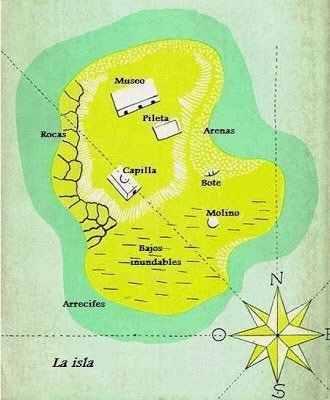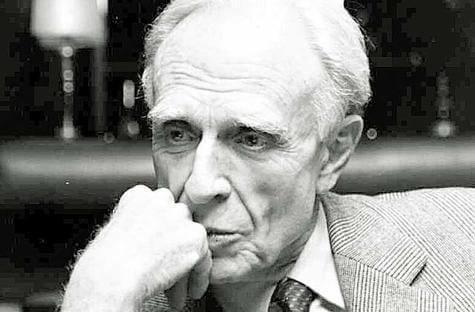The Invention of Morel: a Beautiful Reflection on Immortality

The fear of death is one of the oldest fears of the human race. By contrast, the desire for eternal life and everlasting love forever is one of our greatest desires. The Invention of Morel, by the Argentine writer Adolfo Bioy Casares, combines these fears and desires. It questions them, reflects on them and proposes new ways to approach them.
The Invention of Morel also inspired films, plays and series such as: the 1961 film El Año Pasado en Marienbad (Last Year in Marienbad), the Lost series, and the 1986 Argentine film Hombre Mirando al Sudeste (Man Looking to the South East), among others. The novel, published in 1940, was the one that opened the way to the genre of science fiction in Spanish America.
Bioy Casares was an author who was well-known in his native country, Argentina. He was a friend of Borges and linked to the Ocampo sisters (he was married to one of them). He surrounded himself with the most outstanding writers of the time, at a time when numerous literary movements were taking place in Buenos Aires. Such was the friendship with Borges that in The Invention of Morel we can see a prologue written by Borges himself.
Fiction and everyday life in The Invention of Morel
We could say that Bioy Casares was ahead of his time, due to his gift of being able to mix everyday elements with science fiction. In his novels, we can see very realistic characters in a not so realistic environment.
In The Invention of Morel, we have a main character, the fugitive, who lives on a remote island fleeing from the law. We do not know his name nor what he has done to have to try and escape the law. He is portrayed as a very everyday character, with very real emotions.
The island he lives on has been abandoned for years; the buildings are old and in disrepair. He soon finds very strange things happening there. Some intruders appear on the scene who just continually repeat the same actions over and over again. The fugitive seems to be invisible to them.

Among the intruders is Faustine, a young woman that the fugitive eventually falls in love with. He tries to talk to her on numerous occasions, but she doesn’t seem to see him. It is as if he didn’t exist. On the other hand, we have Morel, a scientist who also seems to be in love with young Faustine, and whom the fugitive detests.
We soon see that these intruders are nothing more than images of a past that allude to people who were once were on the island. Morel devised a machine that was able to record all these movements and people. He was able to save their essence, their desires, and their thoughts and all their being. In this way, they would live eternally in a happy memory that they wouldn’t remember. Something like the eternal recurrence of Nietxsche, but reliving a week of their lives for all eternity.
“I’m not dead anymore, I’m in love”
-Fugitive, The invention of Morel-
Fear of death and immortality in fiction
Death becomes part of us ever since we are born. Every day, every minute and every second of our lives bring us a little closer to it. The problem comes when this becomes a fear and we have problems accepting it. To overcome this fear, some religions and philosophical currents propose the idea of ”another life” : a promise of a better life after death.
The belief that man is the union of body and soul says that, in order to liberate our immortal soul, we must live our lives in a certain way to be good men and women. In this way, our immortal part, after dying on the physical plane, will be able to live in peace eternally.
Other religions, such as Buddhism, propose an immortality based on reincarnation. What these stories related to faith demonstrate is that, since ages past, humanity has sought ways to overcome death. It has tried to explain why we die and, in so doing, to try to accept it in the hope of a spiritual life after our physical bodies pass away.
“Fear makes you superstitious”
-Adolfo Bioy Casares-
The beginnings of virtual reality
Whenever we have tried to portray immortality in the world of fiction, we imagine immortal beings like the elves of The Lord of the Rings, or mythological beings, who are in some way divine. In this way, we see that the price to pay for immortality or for trying to emulate it is always high. In The Invention of Morel, the scientist Morel creates a machine capable of giving us immortality of the soul. However, the cost for the mortal body will be very high.
Through cinema and new technologies of the time, Bioy Casares brings us several different reflections, and even anticipates what we know nowadays as virtual reality. He puts forward other ways to gain immortality. The main character in The Invention of Morel seeks immortality from the beginning, but in an indirect and unconscious way.
“Eternity is one of the rare virtues of literature”
-Adolfo Bioy Casares-
Literature is, in a certain way, immortal. We bring an author to life every time we read his works. Literature will become part of posterity and, in this way, the work will be immortal. It is just another form of immortality. The protagonist narrates these facts in a kind of diary, with the hope that someone will find it in the future. On recording this in writing, we could say that he is seeking a type of immortality.

The idealization of love in The Invention of Morel
As we mentioned before, the intruders fail to see the fugitive, and ignore his existence. The fugitive refuses to believe that they haven’t seen him, preferring to think that it is all some plan to capture and deliver him. He refuses to not exist! The intruders couldn’t see him because they were simply images and memories. The fugitive can’t accept that invisibility. In fact, no one on earth would accept anything like that. Not to exist, to be invisible to everyone, is a kind of death for that particular person. They won’t accept it because it is like experiencing death in life.
“It was not as if he had not heard me, as if he had not seen me; it was as if the ears I had were not good enough to hear, as if the eyes I had were not good enough to see “
-Fugitive, Morel’s invention-
On the other hand, the novel also explores love, the idealization of love and how love keeps the fugitive alive. It is his only way of escape, his only desire. The fact is that love is as natural and as human as death, just like the fear of loneliness expressed by the main character.
Despite what it would mean if he were discovered, he hatches evil plans towards them. He believes that they are conspiring together to betray him. And yet, in the end, he doesn’t actually mind that idea. This is because the fugitive fears loneliness and these thoughts are a very human characteristic. In the same way, there is also a lot of jealousy inside him.
Love and immortality
On the other hand, he realizes how illogical his thoughts are, and yet finds them difficult to contain, as anyone would else in a similar situation. In this case, love is related to platonic ideas, and also to the literary topic religio amoris, where the beloved is shown as unattainable, superior and divine.
In addition, love in the novel will be the one that leads to immortality. It will be the trigger of everything, it will be what awakens in Morel the desire to immortalize himself with Faustine. It is also the trigger that makes that same desire appear also in the fugitive.
Bioy Casares, thanks to his passion for cinema and his great ability as a narrator, takes us into a world we can almost visualize. It is indeed worthy of a cinematographic screenplay. It introduces us with a character who loses his mind on several occasions, and yet who writes everything down as a permanent record of everything he lived through on the island. He is, however, a very human character, and surely any of us would act similarly in such a situation. It is, without a doubt, a work that is worth reading, and one that really does invite us to reflect.
“Death is a lived life. Life is a death that comes “
-Jorge Luis Borges-
This text is provided for informational purposes only and does not replace consultation with a professional. If in doubt, consult your specialist.








